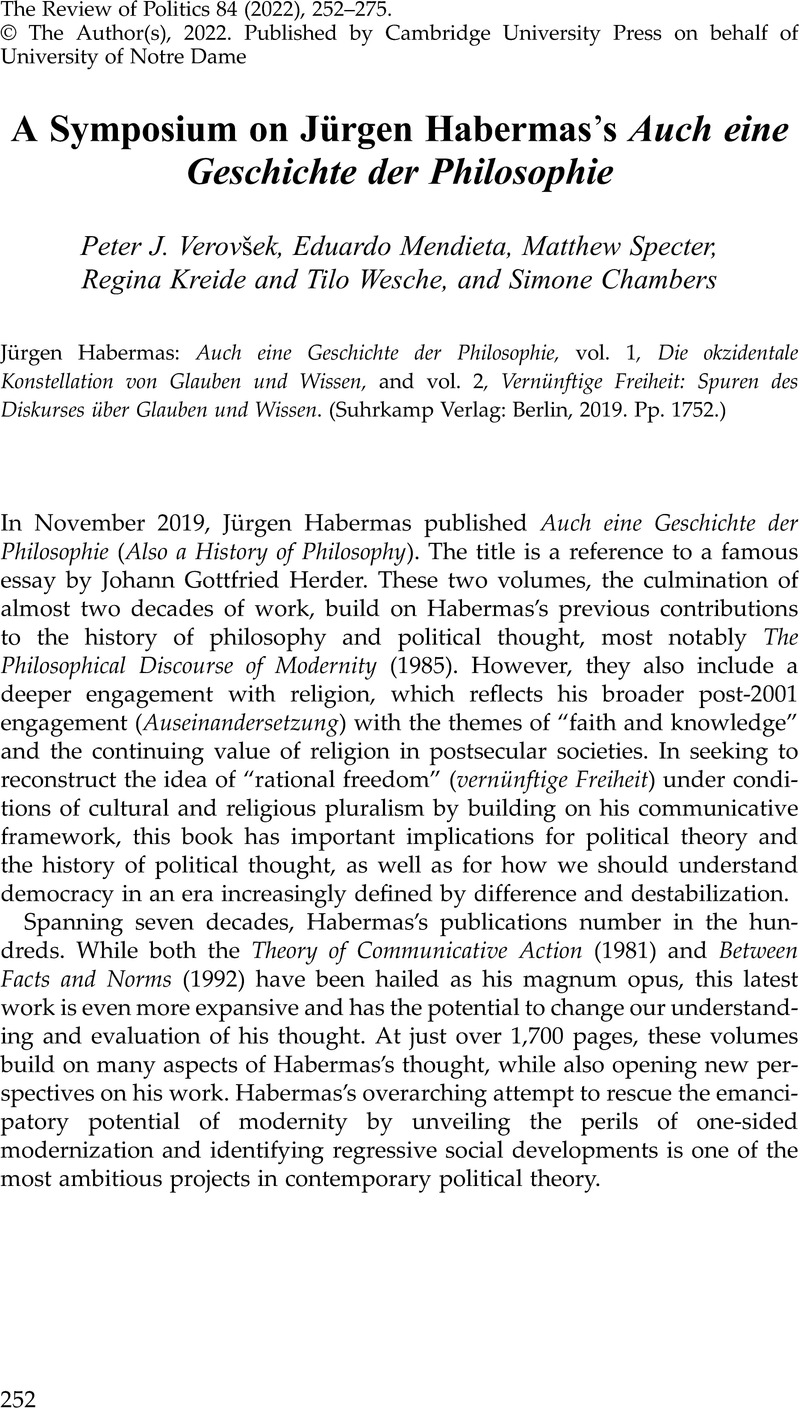No CrossRef data available.
Article contents
Learning Processes in the Discourse of Faith and Knowledge - Jürgen Habermas: Auch eine Geschichte der Philosophie, vol. 1, Die okzidentale Konstellation von Glauben und Wissen, and vol. 2, Vernünftige Freiheit: Spuren des Diskurses über Glauben und Wissen. (Suhrkamp Verlag: Berlin, 2019. Pp. 1752.)
Review products
Published online by Cambridge University Press: 12 April 2022
Abstract

- Type
- A Symposium on Jürgen Habermas's Auch eine Geschichte der Philosophie
- Information
- Copyright
- Copyright © The Author(s), 2022. Published by Cambridge University Press on behalf of University of Notre Dame
Footnotes
In November 2019, Jürgen Habermas published Auch eine Geschichte der Philosophie (Also a History of Philosophy). The title is a reference to a famous essay by Johann Gottfried Herder. These two volumes, the culmination of almost two decades of work, build on Habermas's previous contributions to the history of philosophy and political thought, most notably The Philosophical Discourse of Modernity (1985). However, they also include a deeper engagement with religion, which reflects his broader post-2001 engagement (Auseinandersetzung) with the themes of “faith and knowledge” and the continuing value of religion in postsecular societies. In seeking to reconstruct the idea of “rational freedom” (vernünftige Freiheit) under conditions of cultural and religious pluralism by building on his communicative framework, this book has important implications for political theory and the history of political thought, as well as for how we should understand democracy in an era increasingly defined by difference and destabilization.
Spanning seven decades, Habermas's publications number in the hundreds. While both the Theory of Communicative Action (1981) and Between Facts and Norms (1992) have been hailed as his magnum opus, this latest work is even more expansive and has the potential to change our understanding and evaluation of his thought. At just over 1,700 pages, these volumes build on many aspects of Habermas's thought, while also opening new perspectives on his work. Habermas's overarching attempt to rescue the emancipatory potential of modernity by unveiling the perils of one-sided modernization and identifying regressive social developments is one of the most ambitious projects in contemporary political theory.
References
1 Habermas, Jürgen, The Philosophical Discourse of Modernity: Twelve Lectures, trans. Lawrence, Frederick G. (Cambridge, MA: MIT Press, 1987), 7Google Scholar, emphasis in original.
2 Habermas, Jürgen, The Theory of Communicative Action, trans. McCarthy, Thomas A., vol. 2 (Boston: Beacon, 1987), 77–112Google Scholar.
3 Habermas, Philosophical Discourse of Modernity, 7; Habermas, Jürgen, “Pre-Political Foundations of the Democratic Constitutional State?,” in Dialectics of Secularization: On Reason and Religion, ed. Schuller, Florian (San Francisco: Ignatius, 2006), 44, 50Google Scholar.
4 Ibid., 38; Habermas, Jürgen, An Awareness of What Is Missing: Faith and Reason in a Post-Secular Age, ed. Cronin, Ciaran (Cambridge: Polity, 2010)Google Scholar.
5 Habermas, Jürgen, The Future of Human Nature (Cambridge: Polity, 2003), 101Google Scholar.
6 Ibid., 102.
7 Verovšek, Peter J., “Habermas's Politics of Rational Freedom: Navigating the History of Philosophy between Faith and Knowledge,” Analyse und Kritik 42, no. 1 (2020): 198CrossRefGoogle Scholar.
8 Quoted in Hennig Klingen, “Die Philosophie muss nicht zur Verbesserung unseres Wissens von der Welt beitragen,” Neue Züricher Zeitung, November 14, 2019.
9 Habermas, Jürgen, Between Naturalism and Religion: Philosophical Essays (Cambridge: Polity, 2008), 116Google Scholar.
10 Habermas, Future of Human Nature, 103.
11 This quotation from Jóhann Pall Árnason appears as an epigraph at the beginning of AGPh, vol. 1.


